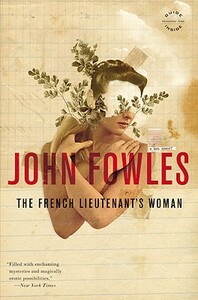Take a photo of a barcode or cover
emotional
reflective
sad
medium-paced
Plot or Character Driven:
Character
Strong character development:
Complicated
Loveable characters:
No
Diverse cast of characters:
No
Flaws of characters a main focus:
Yes
emotional
hopeful
mysterious
reflective
slow-paced
Plot or Character Driven:
Character
amazing story of mysterious longing
I’m not sure whether I loved or hated the fact that this novel had two endings. I loved the impropriety of it. I resented the ambiguity. But I respected the artistry of it. All in all, I enjoyed this thoroughly. The period drama, the comment on life and relationships, social life and the commentary on foolish norms that limit honest love. I really appreciated that the characters have glaring faults and the puzzle pieces didn’t just fall into place. A well-written, beautifully crafted work.
enjoyed the writing and the risks Fowles has taken; however the plot continually fails to engage me and I can't invest much in the characters.
The first 300 pages of this was very dull. Then after the first ending, it suddenly became very exciting. Greatly appreciated the narrators voice and the commentary on the hypocrisy of Victorian culture, especially through Fowles own, somewhat hypocritical 1950s lense.
Favorite Quote:
We all write poems; it is simply that poets are the ones who write in words.
Favorite Quote:
We all write poems; it is simply that poets are the ones who write in words.
“We all write poems; it is simply that poets are the ones who write in words.”
“It is only when our characters and events begin to disobey us that they begin to live.”
“There is only one good definition of God: the freedom that allows other freedoms to exist.”
“You do not even think of your own past as quite real; you dress it up, you gild it or blacken it, censor it, tinker with it...fictionalize it, in a word, and put it away on a shelf - your book, your romanced autobiography. We are all in the flight from the real reality. That is the basic definition of Homo sapiens."
“It is only when our characters and events begin to disobey us that they begin to live.”
“There is only one good definition of God: the freedom that allows other freedoms to exist.”
“You do not even think of your own past as quite real; you dress it up, you gild it or blacken it, censor it, tinker with it...fictionalize it, in a word, and put it away on a shelf - your book, your romanced autobiography. We are all in the flight from the real reality. That is the basic definition of Homo sapiens."
A little confusing in parts but overall a fascinating read into meta-literature and Victorian sensibilities.
Charles and his fiance Ernestina are roaming Lyme, England when they come across the mysterious and perhaps mad woman known as, Tragedy, the French Lieutenant's Woman, or in crude terms the French Lieutenant's Whore). The word is she awaits the return of a Frenchman injured in a shipwreck off the coast. The household Tragedy was a governess for nursed the Frenchman to health and they supposedly had an inappropriate relationship for Victorian times. Charles doesn't think twice about her until he stumbles across her sleeping in the woods. She seems wild and different than any other Victorian woman he's met, even more than Ernestina. Charles feels a connection to Tragedy, whose real name is Sarah, and gains her trust to relate the "true" story of her affair with the Frenchman. Charles comes to learn that Sarah is an extremely complicated woman, whose motivations are a mystery, perhaps even to herself.
This novel portrays the hypocrisy of the Victorian age, the immaculate facade and the hypersexuality lying underneath.
This novel portrays the hypocrisy of the Victorian age, the immaculate facade and the hypersexuality lying underneath.





